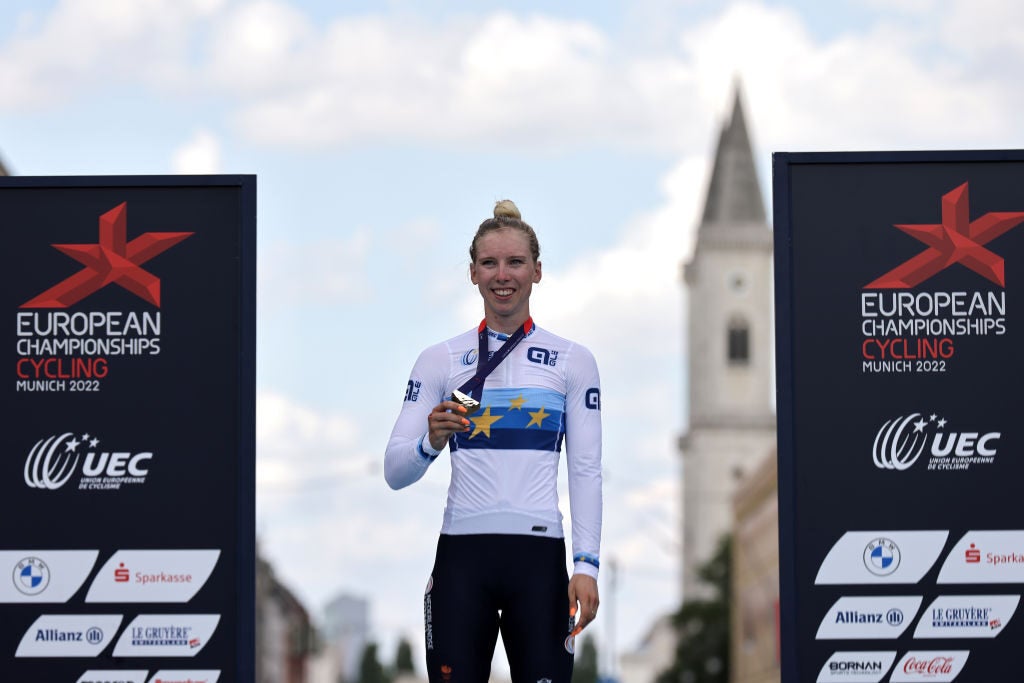Commentary: After some high-profile shockers for the Dutch, Lorena Wiebes puts national team on a high again

Lorena Wiebes with her new European jersey (Photo: Jan Hetfleisch/Getty Images)
Lorena Wiebes swept to victory in Munich on Sunday to claim the European road race title, the sixth time in seven years that the Dutch have won the title.
It wasn’t as emphatic as one may have expected given Wiebes’ form this season, with a fast-closing world champion Elisa Balsamo pushing her right to the line and keeping the gap to less than half a wheel. Indeed, it would have to go down to a photo finish to decide the winner.
A win is a win, though, no matter how close and the success will be a big boost to the national squad after some questionable performances in recent seasons.
There’s no doubt that the Netherlands has the strongest contingent of riders in the women’s peloton. The country has topped the UCI’s nation ranking since 2009, which is as far as the UCI’s records go back, and it hasn’t looked like being toppled from that top spot any time soon.
Also read:
- Lorena Wiebes kicks past Elisa Balsamo to score European title
- Why Dutch riders are dominating the women’s peloton
- Annemiek van Vleuten undone by communication malfunction at Olympic road race
Despite the Netherlands’ utter dominance of the women’s peloton, the national team has suffered some high-profile shockers over the last year or so.
Perhaps the most memorable of those questionable days came in the Olympic road race in Tokyo last season. The women in orange were, understandably, the biggest favorites with a roster that contained Marianne Vos, Anna van der Breggen, Annemiek van Vleuten, and Demi Vollering.
Many wondered if the other nations could do anything to disrupt the immensely strong Dutch team, but they needn’t have worried because they managed to do it to themselves.
Such was the strength of the Netherlands, it let to a weirdly negative race where none of the other nations were willing to work. The Dutch seemed equally unwilling to work and the breakaway was given acres of space. The team still had the win within reach and, with some help from Germany, the break was gradually brought back.
A worlds wobble
Less blatant, but perhaps equally as baffling, was the Dutch performance at the world championships in Leuven two months later. It looked as though the nation had righted the ship with Ellen van Dijk’s solo win at the European championships, but the tactics would go awry again.
The team seemed to be caught between the plan to go on the attack and keeping the bunch together so that Vos could go for the sprint. It saw the team make repeated attempts to get off the front in the final kilometers but also led to the unusual situation of Van Dijk chasing down Van Vleuten with three kilometers to go.
Van Dijk had only just been brought back herself after going on the attack over the final climb before the rise to the finish. Amidst the chaotic performance, Vos didn’t get a lead out going into the finale and had to fend for herself.
“The deal we made in Team NL is that you can ride away but you’ve got to make sure that you can win. That’s not an easy mission and puts a lot of pressure on your shoulders and I didn’t dare to keep going with that group,” Van Dijk explained to the Dutch press after the finish in Leuven.
Former world champion Chantal van den Broek-Blaak pulled no punches in analyzing the team’s tactics.
“This wasn’t a good race on our part. We weren’t riding as a team. Marianne can’t be blamed for not winning. We should’ve been riding as a team much more than how we did. We wanted to do well but for some reason it’s not happening the way we wanted to do it. We’ve got so much power in the group and I think we should’ve started much earlier to take the race in our hands, about halfway through the race,” she said.
Leuven was not the first time that we’ve seen the Dutch seemingly working against their own interests. In fact, the only time the Dutch failed to win the European road race, which came in 2018, they threw away what looked like a clear-cut shot at taking it.
Van der Breggen went away with Elisa Longo Borghini inside the final 10 kilometers. From that group, Van der Breggen would have been the overwhelming favorite to win in a sprint. However, she was told not to work with the Italian as the team had Vos behind for the sprint. It was a gamble that didn’t pay off as the duo was caught inside the final kilometer and it was actually the Italians that won with Marta Bastianelli.
In Sunday’s race, pretty much the entire peloton set about breaking the Dutch and Italians by making it a very aggressive race. However, the Netherlands stuck to its guns and worked solely for Wiebes and the sprint finish.
Having the fastest rider in the peloton on the team made it a pretty clear-cut tactical discussion for the nation. It would have been baffling to choose any other option, with Wiebes there to finish it off.
Though it will certainly be a boost for the Dutch cycling federation, the KNWU, the biggest test of the team’s tactics will come in Wollongong at the world championships at the end of next month. Can the riders strike more of a cohesive unit on a course where the team has multiple options?
Only time will tell.